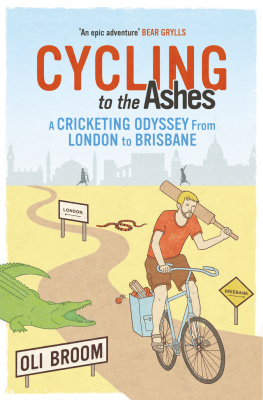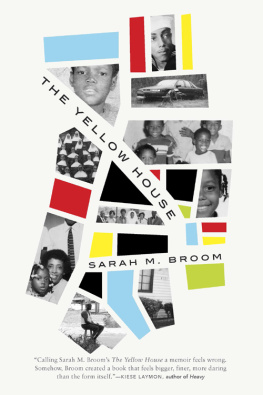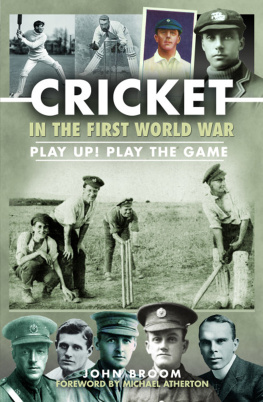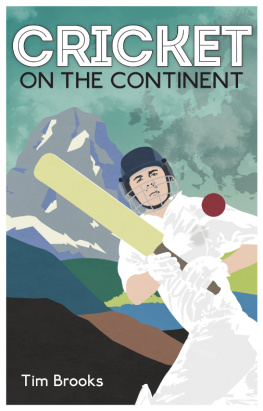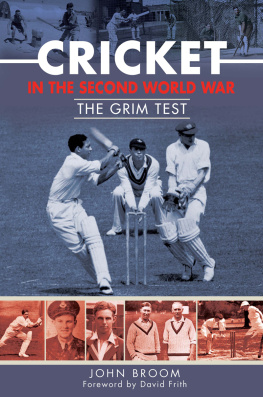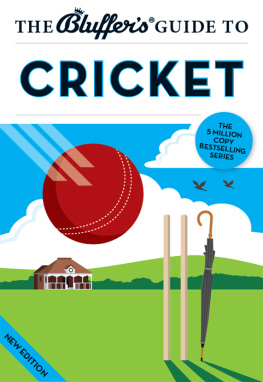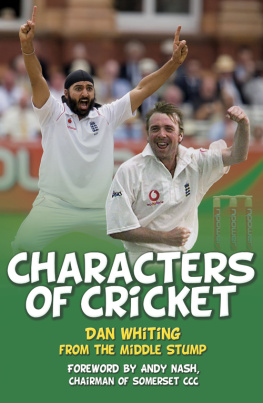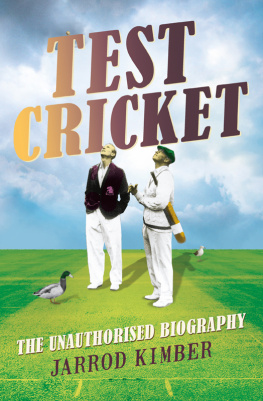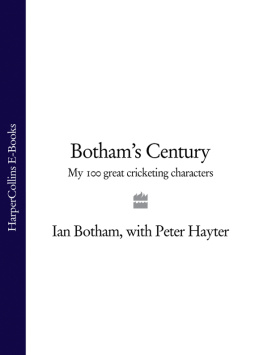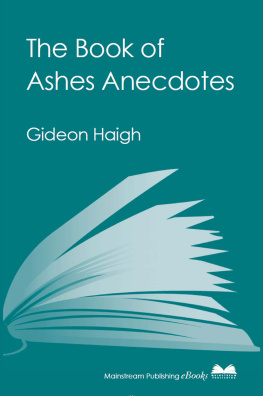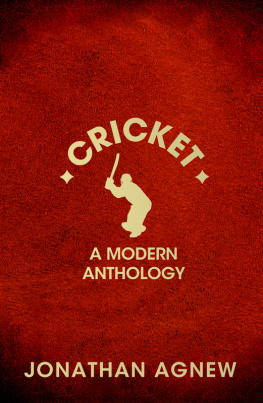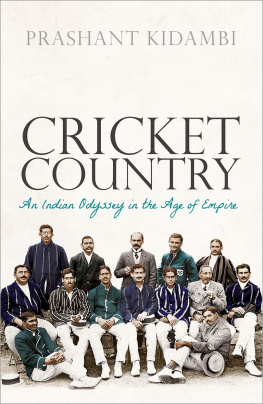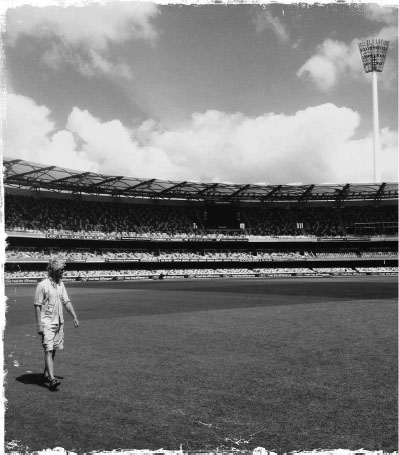CONTENTS
About the Book
One man, one bike, two Mongoose cricket bats, one tropical disease, 16,000 miles and a lot of dead kangaroos...
Oli Broom loves cricket. So much so that in 2009 he left his 9 to 5 in London and set off to cycle to Brisbane for the Ashes. Along the way he played cricket in the shadow of the Blue Mosque, slept in a goat pen in Sudan, dodged a 5-metre crocodile in the outback, battled mountains in sub-zero temperatures in Bulgaria and successfully negotiated the treacherous highways of India.
Starring the colourful characters he met on his travels, this is a funny and poignant tale for anyone whos ever dreamt of jacking in the day job to embark on an incredible adventure.
About the Author
Oli Broom worked as a chartered surveyor until 2009 when he set off overland by bicycle from London to Brisbane. His adventure raised funds for Lords Taverners and the British Neurological Research Trust. Since hopping off his bike Oli has lived in Rwanda where he was the Project Director of the Rwanda Cricket Stadium Foundation.
To Mum, Dad and Annabel... and to Peggy
Cycling to the Ashes
A Cricketing Odyssey from London to Brisbane
Oli Broom

INTRODUCTION
BREAKBONE 30 June 2010
My bones ache to their core. I can hold down neither food nor drink. A rash covers my torso. My white blood cell count is perilously low and I am hours away from a blood transfusion. I weigh sixty-seven kilograms fifteen kilos less than I did last October. From my hospital bed I can see a main road leading south out of town, snaking through uninterrupted jungle before climbing up and over a high ridge, out of sight towards the Burmese border. I should have ridden that road nearly two weeks ago but the past few months have pushed me to mental and physical breaking point. I have finally cracked.
A week ago I was found unconscious in a flower bed. After six days in my room with worsening flu I suffered a blackout trying to find water in my hostel. I fell, first into a large stone Buddha (knocking his head off, apparently), then down a rogue step and head-first into a stone ledge overhanging a cactus-filled flower bed. You must go hospital, the hostel cleaner told me as I came round. Now it is three days until my thirtieth birthday and I am alone in northern Thailand, on an intravenous drip with breakbone, or dengue, fever and a black eye.
Thailand was supposed to be one of the more straightforward legs of my journey. After the cold of Turkey, the heat of Sudan and the ordeal of the Indian subcontinent, I had been looking forward to a fresh start in my nineteenth country; to pedalling hard, eating well, enjoying beautiful jungle and coastline in a country I had never visited before. On the ride into Chiang Mai I got a welcome shock to the system when I noted order and cleanliness on the streets. Drivers used their brains and occasionally their vehicles brakes and indicators; no one spat in my direction. An Australian expat directed me to a hostel that turned out to have bed-bug-free beds; it even had a small swimming pool. Thailand had promised much.
Now the doctors tell me it will take at least three months to recover. In three months time I am supposed to be on the boat to Australia to complete the final leg of my journey; a journey that has already provided me with enough ups and downs to last a lifetime, but one that I desperately want to finish.
I am more than two hundred bicycle days and ten thousand miles from home. I have not spoken more than a sentence to another soul in days; not to a friend for weeks. I am lonely. Since leaving London I have often felt strong, occasionally brave; now I am ill, weak and lacking an ounce of motivation. I want to fall into the arms of a loved one and tell them to take me home. Right now, quitting is the only option, which means the road has come to an end, and I have failed.
The Gabba I made it.
Ever bike? Now thats something that makes life worth living!
Jack London
Cricket brings the most opposite characters and the most diverse lives together. Anything that puts very many different kinds of people on a common ground must promote sympathy and kindly feelings
Kumar Shri Ranjitsinhji
The aim of English cricket is, in fact, mainly to beat Australia
Jim Laker
LONDON TO BRISBANE

MY BIKE

FIRST INNINGS
ENGLAND
LEAVING HOME 10 October 2009
My alarm sounds a few minutes before six oclock but Im already awake, head throbbing from last nights leaving party. I roll over and hit the snooze button. Five minutes later I do the same, hiding under the duvet, pretending Ive woken to just another day.
A knock on the door. Breakfast. Porridge. I peer behind the curtain to see what the weather is doing. It is still dark but I can make out the trees on the village green, swaying in a gusting wind; headwind or tailwind?
I muster the energy to crawl out of bed, find a towel and head for the shower; my last shower. I stand still until the water runs cold, eager to delay the inevitable. The porridge is stuck to the pan by the time I make it downstairs. Burnt. I gulp it down anyway. Im going to need porridge today, of all days.
I HAD PACKED my four panniers the night before and now they stood ominously by the front door, ready to be loaded into my dads car; my tent, sleeping bag and, of course, my bicycle, too. We had all mucked in: Mum, Dad, my sister, Annabel, and me. We soon discovered that everything I would need for the next year fitted comfortably into the confined space at the back of a Volvo estate. Life was about to get a whole lot less cluttered.
I took one last look at the four walls I called home, prayed I would see them again soon and lowered myself into the passenger seat. There were no goodbyes before we pulled on to the B482 and began the half-hour journey to London. They would come later. The sun made a brief appearance in a very English sky shrouded in low-hanging early morning mist, but it quickly disappeared and would remain out of sight for the rest of the day. Pulling away from the traffic lights as we joined the M40, we reached seventy miles per hour within a few seconds and it occurred to me that it might be the fastest I would move for the next fourteen months. I hoped it would be. I had become so used to being mechanically transported to my destination, whether by car, train or aeroplane, that the thought of nothing but my spindly legs propelling me forwards was liberating. It was also, now that my departure loomed, terrifying. So while I could, I enjoyed the effortlessness of car travel until we turned into the car park at Lords Cricket Ground in north-west London.
The ground is named after Thomas Lord, an eighteenth-century Yorkshireman who was a bowler and general attendant at Londons White Conduit Club in the 1780s. In 1786 he was approached by members to find a private cricket ground and in May 1787 got hold of seven acres off Dorset Square in Marylebone.
Next page
